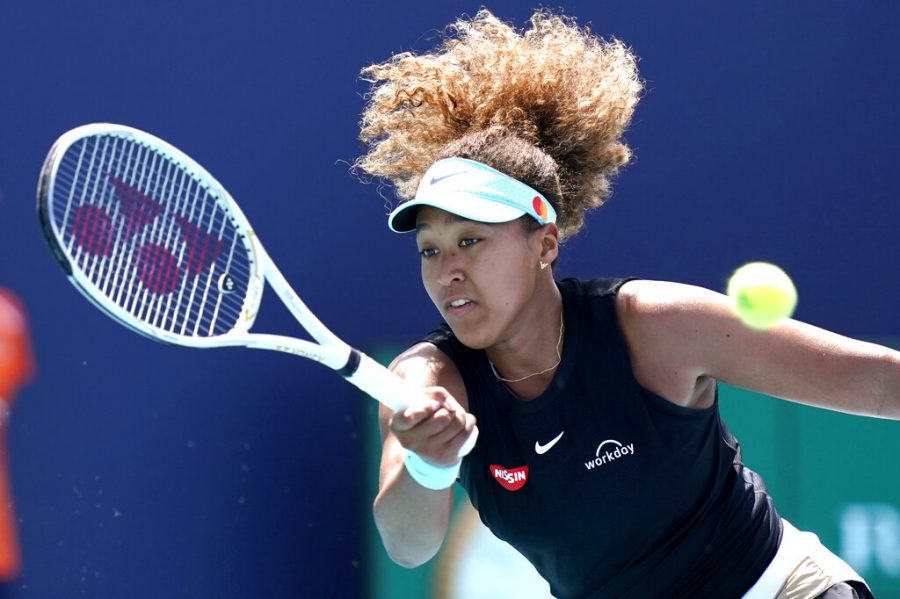Naomi Osaka sponsors praise tennis star’s mental health advocacy
Sweetgreen, Nike and others supported Osaka’s decision to prioritize her mental health after she withdrew from the French Open.
Naomi Osaka returns to Maria Sakkari during the quarterfinals of the Miami Open tennis tournament in 2019.
June 3, 2021
NEW YORK — A few years ago, a star athlete dropping out of a major tennis tournament over mental health issues might have been seen as a sign of weakness.
Today, at least for Naomi Osaka’s corporate sponsors, it is being hailed as refreshingly honest.
That would explain why so many have stuck by Osaka after the four-time Grand Slam champion announced Monday that she was withdrawing from the French Open because she didn’t want to appear for the requisite news conferences that caused her “huge waves of anxiety.”
Osaka, who also acknowledged suffering “long bouts of depression,” received criticism from some who say the media events are just “part of the job.” But Nike, Sweetgreen and other sponsors put out statements in support of the 23-year-old star after she revealed her struggles.
— NaomiOsaka大坂なおみ (@naomiosaka) May 31, 2021
Allen Adamson, co-founder of marketing consultancy Metaforce, said that Osaka’s disclosure has made her a more authentic spokesperson — and more valuable to corporate sponsors.
“Every athlete gets a sports sponsorship because they win games or perform well,” he said. “But the best ones become true brand ambassadors when they have a broader persona. The best brand ambassadors are real people. (Osaka) is talking about an issue that is relevant to many people. Mental health is a bigger issue than winning or losing tennis.”
Reilly Opelka, a 23-year-old American tennis player seeded 32nd at the French Open who plays his third-round match Friday, told The Associated Press he’s glad Osaka is taking time to get better.
“She’s one of the best players in the world — she’s very influential,” Opelka said. “The sport needs her. She’s an icon. It’s bad for the sport to have one of the main attractions not around.”
Osaka, who was born in Japan to a Japanese mother and Haitian father, moved to the United States with her family when she was 3. She now lives in Los Angeles.
Forbes listed Osaka as the world’s highest-paid woman athlete, earning $37 million in 2020 from blue-chip sponsors such as Tag Heuer, AirBnB, and Louis Vuitton as well as Mastercard and Nike.
Nike has stood by sports stars after other controversies, including Tiger Woods after his 2009 sex scandal and former 49ers quarterback Colin Kaepernick after he knelt during games to protest police brutality against Black people. But it recently dropped Brazilian soccer star Neymar after he refused to cooperate with an internal investigation into sexual assault allegations from a Nike staffer.
Osaka joins a growing list of top-tier athletes speaking out about mental health. Olympic swimmer Michael Phelps, NBA players Kevin Love and DeMar DeRozan, and the WNBA’s A’ja Wilson have all spoken publicly about their bouts with depression, sharing both the successes and setbacks.
The episode also could serve as a tipping point for the professional tennis tours — and leagues in other sports — to safeguard athletes’ mental health as well as their physical health, said Windy Dees, professor of sport administration at the University of Miami.
“It’s absolutely a growth opportunity for the (Women’s Tennis Association) and all leagues. There’s a lot of work to be done,” Dees said.
Marketing consultant Adamson said Osaka’s decision to come forward could encourage more athletes to divulge their own mental health battles. He noted that if Osaka had revealed her bouts with depression 10 years ago, her corporate sponsors likely would have stayed on the sidelines because the issue had been taboo. But, he noted, the pandemic has raised awareness around mental illness.
From August 2020 to February, the percentage of adults with recent symptoms of anxiety or a depressive disorder increased from 36.4% to 41.5%, based on a survey by the U.S. Centers for Disease Control and Prevention and the Census Bureau.
The survey also found the percentage of those reporting that they didn’t get the help they needed increased from 9.2% to 11.7%. Increases were largest among adults 18–29 years old and those with less than a high school education.
Ken Duckworth, chief medical officer for the National Alliance On Mental Illness, said Osaka’s decision to go public is a positive development for all people who feel isolated.
“We are moving from mental health and mental illness as a ‘they” thing to a ‘we’ thing,” he said. “These are ordinary common human problems. And I firmly believe that isolation and shame directly contributes to people not getting help. I look at a great athlete, an exceptional athlete, as one potential role model.”



